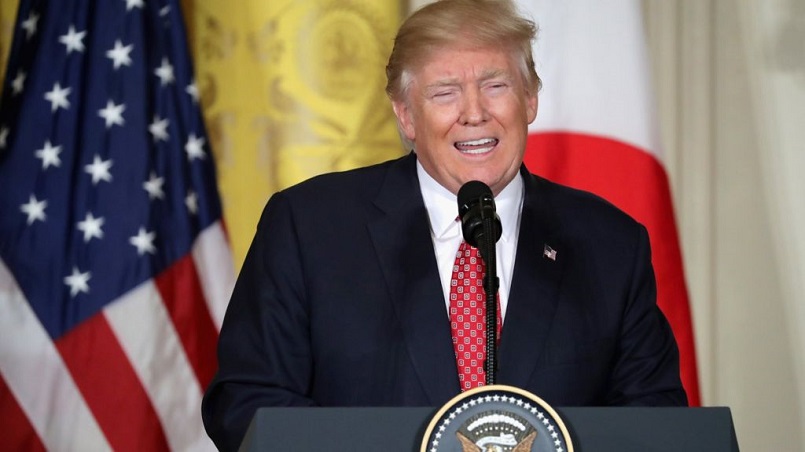
President Donald Trump has said he has "no doubt" his administration will win legal challenges to his travel ban.
In a press conference with Japanese PM Shinzo Abe, Mr Trump also promised to move "rapidly" to introduce "additional security" steps for the US next week.
He spoke as Virginia state lawyers argued in court that his policy "resulted from animus toward Muslims".
And on Thursday, an appeals court said the administration failed to offer "any evidence" to justify the measure.
But the seven-nation ban has not been struck down; it is just in limbo while courts debate its legality.
"We are going to keep our country safe, we are going to do whatever is necessary to keep our country safe," Mr Trump said at the White House on Friday.
"We'll be doing something very rapidly having to do with additional security for our country, you'll be seeing that sometime next week," he added.
"In addition we will continue to go through the court process and ultimately I have no doubt that we'll win that case."
Mr Trump did not clarify what he meant by additional steps, but his remarks were in response to a journalist's question about whether he was considering fresh executive orders.
What's this Virginia case?
It is one of a dozen lawsuits now moving through the US court system against the Trump administration's policy.
Virginia Attorney General Mark Herring's spokesman said it would be "the most in-depth examination of the merits of the arguments against the ban".
The challenge focuses on the travel restrictions imposed by the ban, rather than the four-month suspension of refugee admissions.
But lawyers for the US government in Virginia wrote that "judicial second-guessing" amounted to "an impermissible intrusion" on Mr Trump's constitutional authority.
The judge hearing the case was appointed by President Bill Clinton in 1993.
What happened on Thursday?
The 9th US Circuit Court of Appeals said it would not block a ruling by a Seattle court a week ago that halted Mr Trump's 27 January executive order.
The San Francisco-based court's three judges unanimously agreed that the government had not proved that any terror threat justified reviving the ban.
It means visa holders from Iran, Iraq, Libya, Somalia, Sudan, Syria and Yemen can continue to enter the US, and refugees from around the world, who were also subject to a temporary ban, are no longer blocked either.
But the ruling does not affect one part of Mr Trump's controversial executive order: a cap of 50,000 refugees to be admitted in the current fiscal year, down from the ceiling of 110,000 established under Barack Obama.
What was the reaction?
On Friday morning, Mr Trump was still fuming about the ruling, calling it "a disgraceful decision!"
But it is not clear if he intends to ask the US justice department to file an emergency appeal to the Supreme Court, or keep battling in the lower courts.
Mr Trump is currently trying to fill a vacancy on the nine-seat bench of the highest court in the land, which is seen as ideologically split 4-4.
Republicans said Thursday's ruling was to be expected from a court perceived to be liberal-leaning.
Some legal commentators criticised the decision's lack of comment on a 1952 law giving the president power to suspend entry of "any class of aliens" when he finds their entry "would be detrimental" to the country.
However, the law was revised in 1965 to stipulate that immigrants could not be denied a visa because of their race, sex, nationality or place of birth.
